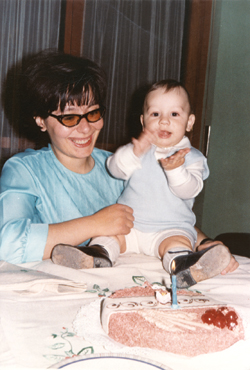
On the Road to Retirement
The Economic Impact of an Aging Generation
By Riley Mackenzie
In the movie Gran Torino, Clint Eastwood's character, Walt, gets a gift from his son and daughter-in-law: a telephone "for old people," with giant buttons and numbers.
He throws them out of the house.
As members of the baby boom generation reach the cusp of their retirement years, there's a lesson in that scene. The people who brought you rock 'n' roll, the sexual revolution, the women's movement and the longest economic expansion in American history won't be going quietly into their golden years. If anything, they'll drag the U.S. economy by the ear along with them.
After all, the boomers have grown accustomed to getting what they want.
"This tends to be a much more savvy population of seasoned folks than previous generations," says Nancy L. Smith, MBA '94, president of the market research and consulting firm Analytic Partners. "They don't act like previous generations."

"Many baby boomers will want to leave a bequest to their children, so they will continue to leave money in equities. People will continue to buy stocks."
Cristian Tiu
Assistant Professor
Finance and Managerial Economics Department
And so, as the 76 million Americans born between 1946 and 1964 edge warily toward retirement (the leading edge of the cohort is turning 65 this year), observers are taking stock of how this development will affect the economy as a whole.
The news, it turns out, is not all bad.
I don't care too much for money, money can't buy me love... ("Can't Buy Me Love" - The Beatles)
For those who do care about money, the prospect of hordes of baby boomers selling the stocks in their 401(k) and IRA accounts to fund their retirement years has been worrisome. Cristian Tiu, assistant professor of finance and managerial economics, says about 35 percent of all equities are held in retirement funds.
Some academic studies have seen the threat of downward pressure on stock prices as all too real, he says. But mitigating factors are at work: Some boomers will work at least part-time in retirement, for example, and put off selling their stocks. "And many baby boomers will want to leave a bequest to their children," he says, "so they will continue to leave money in equities. People will continue to buy stocks."

"You go to work and you work a lot harder than you used to."
Jerry M. Newman
SUNY Distinguished Teaching Professor
Chair, Organization and Human Resources Department
His own worry is that the market will be affected through indirect channels. By some estimates, $3.6 trillion in pension fund obligations is unfunded. As pension administrators and university endowments try to bridge that gap, Tiu says, "They may decide that their asset allocation should move out of U.S. stocks and into other investments, such as real assets or commodities. They may shift out of traditional asset classes. This is what worries me more-when pension plans hunt for yield."
It's been a hard day's night, and I've been working like a dog... ("A Hard Day's Night" - The Beatles)
Jerry M. Newman, SUNY Distinguished Teaching Professor and chair of the Organization and Human Resources Department, says one effect of the boomers' coming retirement is that the recent focus on productivity in the workplace will only intensify. "You go to work and you work a lot harder than you used to," Newman says. Now, he says, as people at the high end of the wage scale begin to retire, cost-pressured companies will ask other workers to pick up the slack.
Isaac Ehrlich, SUNY Distinguished Professor in the Department of Finance and Managerial Economics, sees an additional benefit to the broader economy: the economic leverage of the boomers' well-educated children. "We are already on a very stable and steady growth path," Ehrlich says, "and I expect it to continue as long as knowledge continues to improve." These educated offspring of the boomers, he says, "can do well in more sophisticated jobs" and can improve productivity even further.

"Baby boomers are demanding ease of use. The technology has to be accessible."
G. Lawrence Sanders
Professor
Management Science and Systems Department
Where demographers see economic strains as current workers struggle to support older retirees, Ehrlich sees a beneficent force: Because people are living longer, they're more motivated to obtain advanced education and training. He gives a nod to history: Massachusetts statistics from 1850, he says, show an average life span of about 40. "Who wants to go to college when you die that young?" he asks. "Now life expectancy has effectively doubled, and there is time to recoup the investment."
When I get older, losing my hair, many years from now, will you still be sending me a valentine, birthday greetings, bottle of wine? ("When I'm 64" - The Beatles)
Well, there's minoxidil for the male-pattern baldness. And, says Professor Arun K. Jain of the Department of Marketing, plenty more products are on the horizon to feed the baby boomers' appetite for, well, themselves.
"All of us want to look at our ideal self," Jain says, "and these people don't want to feel sorry for themselves. They want a better life. If you want to sell products to them, you need to present products that create that. This demographic shift has been on companies' radar screens for at least five years."
The boomers hold personal appearance in high regard, he says, and they'll reach far to hold on to their youth or the appearance thereof. For example, consumers spend $1.6 billion a year on anti-aging products such as facial creams, a market that is expected to grow by 20 percent in the next few years. "This is a basic need, to feel and look good," Jain says. "Even in the nursing home, they want to look pretty." The market is growing rapidly as well, he says, for body-sculpting cosmetic surgery: lifts for the eyes, breasts and buttocks, hair transplants, tummy tucks, liposuction, collagen injection.

"If you want to sell products to them, you need to present products that create that [ideal self]. This demographic shift has been on companies' radar screens for at least five years."
Arun K. Jain
Samuel P. Capen Professor of Marketing Research
Marketing Department
Jain also sees two other boomer-retirement trends that will drive buying decisions. First, because older populations skew female, marketers will recognize that women play a critical role in major purchases. And boomers will demand high-touch, high-quality service. "They're used to good service, so in their golden years they are not going to change that," Jain says. "These people will be big gift givers for their children and grandchildren. If a department store doesn't treat them right, they're going to regret it."
That level of user-friendliness will affect how personal electronics develop as well, says G. Lawrence Sanders, professor of management science and systems. "Baby boomers are demanding ease of use," he says. "The technology has to be accessible. They have a standard that says, this should work."
But once that standard is met, developers of software and hardware will find an enthusiastic audience in retired boomers, Sanders says. "Baby boomers are communicating, buying, doing mobile banking, doing social networking through pad computers," he says. "The banking industry is very interested in that demographic and very interested in developing apps that baby boomers can use."

He also thinks boomers' use of social networking has been underestimated. Many boomers, he says, are "reconnecting with aspects of their past life" through Facebook and other applications, and realizing that it's a useful tool for keeping in touch with distant grandchildren.
Her baby buys her things, you know. He buys her diamond rings, you know. ("I Feel Fine" - The Beatles)
Smart marketers are sensitizing themselves to the attitudes of the retiring boomers. Smith, of Analytic Partners, says the lodestar for her was a photo she first saw two decades ago, of a 70-year-old man waterskiing. "I've seen that photo used in so many different places," she says. "The symbolism is that you can still enjoy life. That's not ineffective in talking to that generation."
She also says that manufacturers of consumer products, recognizing the boomers' purchasing power, are moving into "premiumization" of their products. For example, Smith says, Procter & Gamble has expanded on its line of Pantene shampoos and conditioners to create products it can price 20 to 30 percent higher and market as tailored to the consumer's specific needs, including the needs of silver hair. That trend is evidenced in many categories, she says, including premium ice creams and candy.
But she acknowledges that advertisers, who traditionally have coveted the 18-to-49 demographic, are not mostly targeting the 64-plus population. "What we're looking at is the 50-plus, 60-plus crowd, which will be growing substantially in the next five to 10 years," she says. "Many of them are still working."

"I think we're coming to the point where Congress is going to have to do something, particularly with Medicare."
Ann Burstein Cohen
Associate Professor
Accounting and Law Department
And still buying-even houses. In his work as a licensed real estate associate broker with Gurney Becker & Bourne in Buffalo, James Mack, MBA '89, sees the boomers' impending retirement as creating some opportunities in real estate.
First, he says, retirees looking to scale back are moving to ranch-style homes or condo complexes, making larger homes more available for younger families to buy. Or older folks may buy a two-family home, live downstairs and rent the upstairs to the kids to help support their young family.
Also, Mack says, he sees people downsizing to a smaller home in their hometown, then taking the sale proceeds and buying a winter home in Florida, Texas or the Southwest. The real estate market is still so poor in those areas, he says, that the dream of a sunny, low-maintenance winter home is becoming a reality for more retirees-and helping to prop up the national real estate market.
Whatever their decisions, Mack says, boomers "are empowered by the thought that they're making their own choices," and many are doing so relatively early. "They want to make their decisions when they're capable of making the decision," he says.
When I was younger, so much younger than today, I never needed anybody's help in any way. ("Help!" - The Beatles)
The coming wave of older patients will place extraordinary demands on the health care delivery system, says Tamara B. Owen, EMBA '02, president of Millard Fillmore Gates Circle Hospital in Buffalo and vice president of Kaleida Health.

"I see people downsizing to a smaller home in their hometown, then taking the sale proceeds and buying a winter home in Florida, Texas or the Southwest."
James Mack, MBA '89
Licensed Real Estate Associate Broker
Gurney Becker & Bourne
(Photo: Tom Wolf)
Because optimism will get you only so far. The correlation between aging and chronic conditions is undeniable, Owen says, and as the 65-plus population nearly doubles by 2020, more than six in 10 boomers will be managing at least one chronic condition. That means millions more people dealing with arthritis, chronic obstructive pulmonary disease (COPD), heart disease, diabetes.
It's not hospitals that will feel the crunch most acutely. Only the sickest people stay long in a hospital these days, thanks to insurance reimbursement pressures. "The health care industry needs to mushroom in subacute, rehabilitation and chronic care," Owen says. "We need to develop systems that manage chronic cases across the spectrum." She also expects growing shortages of orthopedists, endocrinologists, rheumatologists, cardiologists and geriatricians.
One substantial trend, Owen says, is in joint replacements: By 2030, eight times as many people will be seeking to replace worn-out or damaged knees and hips. These are principally the "active elderly," she says. "Their bones and joints wear out, and they're not happy sitting around having a sedentary lifestyle." The good news is that the surgery is less invasive than it used to be, and improved replacement joints likely will last for 20 to 25 years.
Even in health care, Owen says, the boomers are asserting themselves as consumers. "There's that mentality," she says. "They want everything instantly, and they want more personalized, individualized treatment. Hospitals are turning into five-star hotels because that's what baby boomers expect. If you're going to be competitive, you have to do it. I look at our patient satisfaction surveys, and they don't talk about our multimillion-dollar MRI machine or the wonderful neurosurgeon. They talk about the food, the environment, the parking."
How do I feel by the end of the day? Are you sad because you're on your own? No, I get by with a little help from my friends. ("With a Little Help From My Friends" - The Beatles)
The biggest question mark about the economic impact of the boomers' retirement years is, of course, how the nation will manage the federal Social Security and Medicare programs. The numbers are as familiar as they are frightening: By 2017, Social Security is expected to start paying out more than it collects in payroll taxes, calling the system's long-term solvency into question. Medicare, which currently consumes 12 percent of the federal budget, is about to swell with tens of millions of boomers turning 65, the age of eligibility.

"Hospitals are turning into five-star hotels because that's what baby boomers expect."
Tamara B. Owen, EMBA '02
President
Millard Fillmore Gates Circle Hospital
(Photo: Tom Wolf)
And where economics and politics meet, it's a dangerous intersection.
"I think we're coming to the point where Congress is going to have to do something, particularly with Medicare," says Ann Burstein Cohen, associate professor in the Department of Accounting and Law. She argues that only significant, long-term sacrifice-in the form of reduced benefits, higher taxes or, probably, both-can return the Medicare and Social Security systems to solvency. But she's dubious that the political fortitude, and the national commitment, are there.
"Can we muster the political will to share that kind of sacrifice?" she asks. She points to the sacrifices made after 9/11 by first responders and by young people who were moved to join the armed forces. But those were narrow subsets of the population. "By comparison," she says, "in World War II you had gas rationing, meat rationing, scrap iron drives and a long-term sense of shared sacrifice." Only that level of shared commitment, she says, can get us out of the Medicare/Social Security mess.
Newman, born in 1947 and thus a card-carrying baby boomer, says his generation's me-first attitude has put pressure on the Social Security system to maintain benefit levels. "We were the flower generation, the peaceniks; then, in our 40s, we were the ones who said, we want what we want now, and saving for retirement can wait. The original intent of Social Security was as a floor of support for individuals. That's the actual language. Over time it's come to be viewed as, 'I don't need to save, Social Security will take care of me.' It's a problem," he says wryly, "with our moral fiber."
Ehrlich notes that in the 1950s and early '60s, five or six workers were supporting each retiree. Today it's closer to two; "the aging of the population bites us in the behind. Fast-forward to Medicare, and it's the same problem. Either we have to cut dramatically, raise taxes or increase the public debt."

"We need to make people more responsible for the way they take advantage of the beautiful social programs that our country provides."
Isaac Ehrlich
SUNY Distinguished Professor
Melvin H. Baker Professor of American Enterprise
Finance and Managerial Economics Department
His solution for Social Security: a gradual move to a defined contribution system in which workers are responsible for their own level of retirement savings. And for Medicare: providing incentives that encourage Americans to maintain and promote wellness, rather than the fire-alarm approach of fixing what goes wrong. "We need to make people more responsible," he says, "for the way they take advantage of the beautiful social programs that our country provides."
Shine until tomorrow, let it be. ("Let It Be" - The Beatles)
The baby boomers won't all retire at once, of course. The often-cited figure of 10,000 new retirees a day fails to take into account the boomers who will work past 65, either full- or part-time; for that matter, those who will retire early; and the 19-year spread of the baby boom cohort. The economic effects of this last chapter in the boomers' life story can be fully known only in retrospect.
And the resilience of the economy continues to hearten many observers. Tiu, for one, sees plenty of reason for optimism. "At one point in the 1970s, we were all worried that because of Japanese technology, we'd all be mopping the floors in Japanese restaurants," he says. "But people moved into jobs that make more sense, and they got more education. In all sorts of circumstances, U.S. society has shown an extraordinary capacity to adapt."
